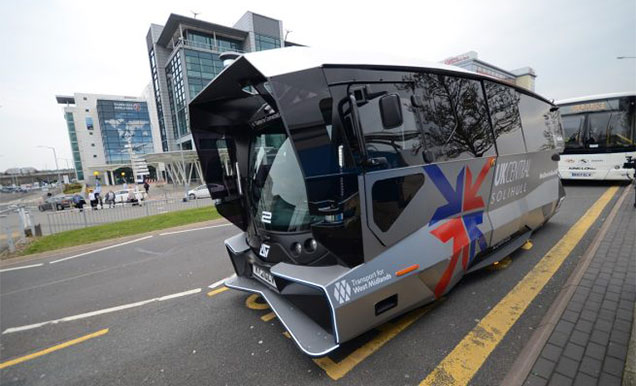Driverless buses added to UK travel network

Autonomous vehicle might seem like a flight of fancy by Elon Musk, but the reality is edging ever closer, and for the UK they’re taking their first steps with public transport. By next year, passengers in the UK will be transported by driverless buses heading to the NEC (National Exhibition Centre) and to Solihull workplaces. As part of a permanent commercial route, passengers will be able to take buses from Birmingham International railway station to Birmingham Business Park through the NEC Birmingham.
Overseen by a regional group led by Conigital, this route forms part of a larger project. There will also be a connection between the Coventry University campus and the Coventry rail station in the Multi-Area Connected Automated Mobility (MACAM) project. The two new routes will be served by a mix of 13 automated shuttles and the scheme will be supported by a new centralised Remote Monitoring Teleoperation (RMTO) centre. The RMTO centre, which is run by Transport for West Midlands, will keep an eye on the automated vehicles and when necessary, use 5G connectivity to control them.
The aim of this project is to make self-driving vehicle operations commercially viable and to reduce technology as well as operator costs. It is anticipated that Solihull Council will receive £279,260 in grant funding to cover revenue for project managing vehicle deployment within Solihull and capital funds for installing roadside technology to enable efficient vehicle operation. Additional funds have also been secured to carry out an early feasibility study into providing a CAV service between East Birmingham North Solihull as part of a separate project. This project will also look at the proposed EBNS transit corridor, of which could link Birmingham City Centre to the upcoming HS2 Interchange Station in Solihull.
Previously Solihull Council has carried out driverless passenger trials at Birmingham Airport and the NEC, where the shuttle was also used in the Commonwealth Games Queen’s Baton Relay. Solihull Council said: “CAV technology has the potential revolutionise the way we get around, as well as how we transport goods. Working with our partners we are excited to be leading the way, not just in Solihull, but regionally and across the country, in providing learning on CAV deployments in different setting and scenarios. We’ve already carried out a series of successful pathfinder trials here in Solihull, using our own automated shuttle. We have shown how it is possible to incorporate automated vehicles practically and safely into key parts of our transport infrastructure.”
This next step of the project trial will help provide a understanding around the commercial viability of self-driving operations and the influence that central RMTO an shared fleets, could have on future business cases.
Hopefully as electric vehicle (EV) infrastructure in the e-mobility industry continues to develop, in the near future we will see a larger people carrying capacity for autonomous vehicles both for public and private transportation services. With scope of faster more efficient CAV development technologies, as the UK works towards a zero emissions transport network, committing to ending the sale of petrol and diesel cars by 2030.